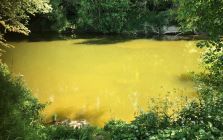
The government’s poor performance on ensuring high water quality standards in England has come into stark relief over the last few months. Launching a strategic Plan for Water back in April, Theresa Coffey, environment secretary, wrote that seahorses, seals and salmon are returning to our rivers and estuaries and that bathing waters continue to improve. Last year, she said, 93% were classified as ‘good’ or ‘excellent’, up from 76% in 2010.
The problem is, most of the public don’t believe her – especially those who can’t swim from their treasured local beach because the water is grossly polluted. They keep asking – ‘why are water company chiefs paid so much when our rivers and the sea are full of sewage?’.
In June, Thames Water announced that it had accumulated debts of £15bn, triggering the possibility that it could be put into special administration and placed, albeit temporarily, in public ownership, to protect 15 million customers. A few days later, it was fined £3.3m for a serious pollution incident.
In an attempt to counter embarrassing headlines, the government rushed through secondary legislation removing the cap on the civil monetary penalties that can be imposed by the Environment Agency on water companies, from £250,000 to unlimited.
This month, pressure on the government ratcheted up even higher, when the Environment Agency’s 2022 environmental performance report gave a damning verdict on the under-performance of English water and sewerage companies. The report concludes that many of the nine English water and sewerage companies are "not meeting basic environmental requirements".
Pollution incidents worsened
The sector achieved 23 stars out of a maximum of 36. The number of pollution incidents worsened from 1,883 in 2021 to 2,026 last year. Severn Trent Water retained a four-star rating for the fourth year. However, Anglian Water and Thames Water were awarded only two stars. Both were warned for repeatedly dominating serious incident numbers. Southern Water and South West Water were awarded only one star. The report calls on them to "make radical changes now to improve their performance".
Serious pollution incidents reduced from 62 to 44. But the report notes that "small improvements are set against the backdrop of poor and inconsistent results over recent years". A slight decrease in the number of storm overflows causing sewage discharges was attributed to the fact that 2022 was a dry year.
Richard Benwell, CEO of Wildlife and Countryside Link, described the increase in pollution incidents in 2022 noted in the report as a "mark of shame" for water companies. He said: "Changes are coming in a slow trickle, while pollution and leakage continue in torrents."
He added: "Increased fines may help, but making polluters pay for the big incidents doesn't make up for the daily stream of pollution. A wholesale shift is needed to make polluters pay, not just to clean up individual incidents, but to fund improvements for our rivers, and nature-restoration across whole landscapes." He warned that weakening current rules for nutrient neutrality "would only add to the utterly unsustainable pollution pressure on precious river habitats."
Pow steps up to the wicket
The collapse of Thames Water, which supplies more than a quarter of English water customers, has been seen as endemic of larger problems that need to be fixed. A week after the environmental performance report was published, environment minister, Rebecca Pow, stepped up to a sticky wicket, facing a gruelling interrogation from the House of Lords’ industry and regulators committee, on water industry regulation.
Citing poor water quality, under-investment and huge levels of water company debt, Lord Hollick, committee chair, accused the government of "incompetence" in its management of the water sector in the past 15 years. Pow responded that £190bn had been invested across the sector since privatisation in 1989 – more than would have been available when it was in the public sector. Only recent high interest rates, she said, had exposed high water company gearing and debt.
New powers under the Environment Act 2021, she told the committee, will give regulator Ofwat powers to directly link water company dividends to environmental performance. Another change is designed to ensure that shareholders, not customers, pay for water company executives’ bonuses when performance has been poor.
It could be too little too late. Water is a doorstep issue and an election is approaching. Ofwat’s next price review will be in 2024, covering the five-year asset management plan (AMP) period, running from 2025 to 2030. AMP 8 will see contracts worth hundreds of millions of pounds awarded to consulting and engineering companies by the nine English water and sewerage companies to invest in new infrastructure.
Water and sewerage issues show no signs of reducing in prominence. A new government may feel that it can’t continue the current structure of the water industry in England, based on private ownership and dividends for shareholders. The nature of the AMP 8 contracts and who they are awarded to could be very different to the current status quo.
